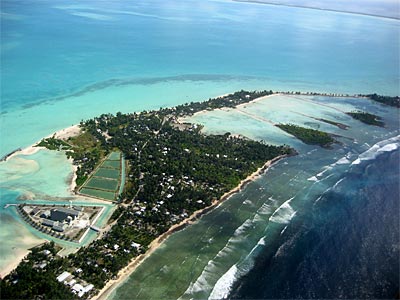
UNICEF has welcomed Kiribati’s move to pass the new Juvenile Justice Bill, ensuring that all children and youth charged with, or alleged to have committed, an offence are treated with respect and protected.
At present, there are 10 young offenders being held in adult prisons in Kiribati. These children and adolescents, and others before them, had to navigate the adult justice system, being held alongside much older offenders and tried as adults.
The new Juvenile Justice Act will set standards for the youth justice system, with a focus on keeping children out of adult prisons. The Act also provides opportunities for the community to participate in rehabilitation and reintegration of youth offenders, ensuring that Kiribati customs and traditions are integrated, where possible, in the youth justice system.
UNICEF’s Chief of Field Office, Cromwell Bacareza applauded the move, saying “This bill, and other recent legislative reform, demonstrates how much Kiribati values its children and young people. It follows the 2013 Children, Young People and Family Welfare Act, another great step for the protection and care of Kiribati’s most vulnerable children. We are delighted that the partnership between UNICEF and the Ministry for Women, Youth and Social Affairs (MWYSA) is producing strong results for children and families.”
Under the Juvenile Justice Act a separate Juvenile Court will be established, so that children in contact with the law do not have to go through the regular court, which is set up for adults. The court will have a child-friendly space and children will be held separately from adults.
Speaking on behalf of the Ministry for Women, Youth and Social Affairs, the Principal of Social Welfare, Teurakai Ukenio expressed MWYSA’s appreciation for UNICEF’s technical and financial support since 2008.
“We have come a long way since Kiribati ratified the Convention on the Rights of the Child in 1995. The UNICEF-supported Child Protection Baseline Research conducted in 2010 has supported us to put in place laws like this that protect our children”.
The Juvenile Justice Act is significant for the people of Kiribati as it involved wide consultation, from policy makers to community members. A Cabinet-endorsed technical working group included representatives from the Attorney General’s Office, Police, Ministries of Health, Education, Women, Youth and Social Affairs, church groups and traditional community leaders. These consultations explicitly acknowledged the value of traditional ways and positive community practices, supporting greater acceptance and ownership of the Act by the people of Kiribati.
Congratulating the government of Kiribati, Bacareza said “UNICEF looks forward to our continued partnership as the new legislation is implemented, this is a great step forward in our shared work to protect all children.”
